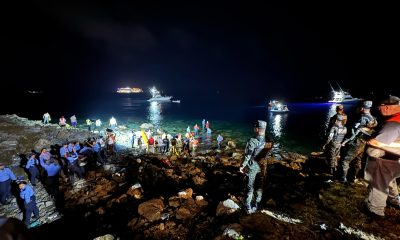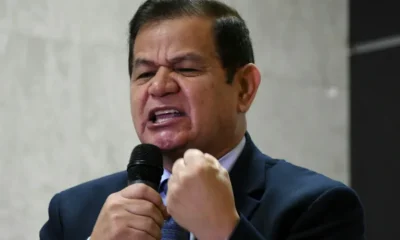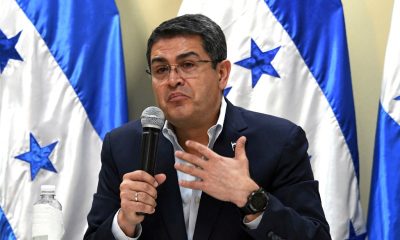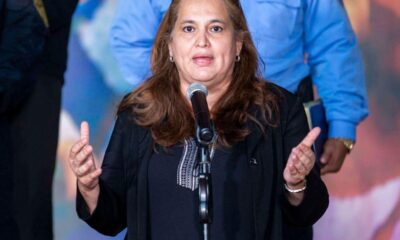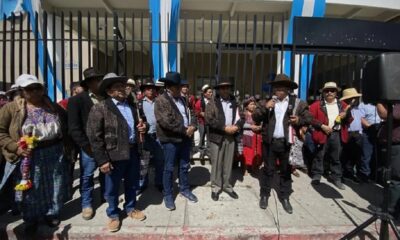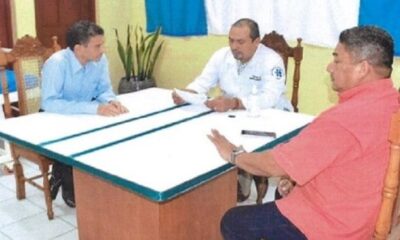Central America
Honduran Congress fails to reach agreement to elect Superior Court

November 24 |
The Permanent Commission of the Honduran Congress, which is composed of nine deputies of the ruling Libre party, including the head of the Legislative, Luis Redondo, appointed Wednesday a special commission to be in charge of the selection process of the judges of the Superior Court of Accounts (TSC).
Meanwhile, in a parallel session, the opposition benches agreed to create another commission to take charge of this selection. The constitutional period of work of the current officials of the TSC expires next December 7.
During this session of the opposition benches, deputy Iroshka Elvir (Partido Salvador de Honduras, PSH) served again as acting president, while Suyapa Figueroa (PSH) and Marlon Lara (Partido Liberal) served as secretaries. Days before, these deputies were denounced for usurpation of functions and abuse of authority.
What happened deepened the division within the Legislative, where out of 128 seats at least 65 correspond to opposition benches which insist on not dialoguing with the ruling party on core aspects of the legislative agenda, in this case the election of a group of authorities, which must be done in periods of time foreseen in the Constitution.
The member of the permanent commission, congresswoman and secretary of the Congress Luz Angélica Smith (Partido Libertad y Refundación, Libre, ruling party) announced that between November 27 and December 4, the Secretariat will be receiving nominations to integrate the TSC.
The special commission created by the Permanent Commission will conduct interviews with the candidates, examine their resumes, evaluate them and then must present a list for election.
The opposition rejected the election of the commission carried out by the Permanent Commission and reiterated its narrative that such body is trying to substitute the Plenary.
Due to the intransigence of the opposition benches, the Permanent Commission relied on the Constitution to appoint, weeks ago, authorities such as the Attorney General and the Deputy Attorney General.
Central America
U.S. and Guatemala Sign Trade Deal Granting Zero Tariffs to Most Exports

The United States signed a reciprocal trade agreement with Guatemala on Friday, under which 70.4% of Guatemalan exports will enter the U.S. market tariff-free.
Guatemalan President Bernardo Arévalo highlighted the importance of the agreement, stating that it creates a framework of cooperation, certainty, and new opportunities for producers, workers, and entrepreneurs in the country. His remarks were shared in a video published on his official social media channels.
In 2025, 30.3% of Guatemala’s total exports were destined for the United States, amounting to approximately $4.3 billion. As a result, the agreement is expected to directly benefit key sectors of the Guatemalan economy, including agribusiness, manufacturing, and the textile industry.
“Today we have taken another step toward consolidating a country that, when it moves forward united, generates confidence, attracts investment, and creates real development opportunities for all its people,” Arévalo added.
The agreement with Guatemala follows a similar trade deal signed by the United States with El Salvador on Thursday, which includes the elimination of a 10% tariff on Salvadoran imports.
Central America
Panama Supreme Court Strikes Down Panama Ports Concession as Unconstitutional

Panama’s Supreme Court of Justice has ruled unconstitutional the concession contract granted in 1997 to Panama Ports Company (PPC), a subsidiary of the Chinese conglomerate CK Hutchison, which operates two strategic ports along the interoceanic canal. The decision was announced on Thursday, January 29, 2026, following two lawsuits filed by the Comptroller General’s Office.
The ruling directly affects the management of the ports of Balboa, on the Pacific coast, and Cristóbal, on the Atlantic side, both of which have been operated by the company for nearly three decades. According to Panama’s Comptroller General, Anel Flores, an audit uncovered irregularities in the contract that resulted in more than $1.3 billion failing to enter state coffers.
“It is a predatory contract, abusive to the interests of the country,” Flores stated.
The Supreme Court determined that Law 5 of 1997, its subsequent amendments, and the automatic extension granted in 2021 are unconstitutional. The ruling noted that the contract renewal took place without adequate oversight and amid allegations of corruption, despite the Panamanian state holding only a 10% stake in the company.
Central America
Guatemala President Says Starlink Terminal Found Inside Prison

Guatemalan President Bernardo Arévalo revealed on Tuesday that a Starlink terminal was discovered inside a prison in the country, highlighting corruption and the illegal introduction of advanced communication technology into the penitentiary system.
Arévalo did not specify which prison the device was found in but stressed that Starlink’s ability to connect directly to low-orbit satellites makes it particularly difficult to disrupt, posing a serious security risk.
The disclosure was made during a press conference attended by Interior Minister Marco Antonio Villeda and Defense Minister Henry Sáenz.
On January 6, specialized units of Guatemala’s National Civil Police (PNC), members of the Army and prison security personnel carried out Operation Sentinel at the Renovación 1 Maximum Security Prison for Men, located in Escuintla. According to the Interior Ministry, the operation aimed to reduce criminal activity, prevent illicit acts and stop the trafficking of prohibited items inside the prison.
During the operation, authorities also dismantled businesses operating near several prisons after detecting routers that were allegedly used to redirect internet signals into penitentiary facilities, according to local outlet Emisoras Unidas.
Tensions escalated further over the weekend of January 17 and 18, when inmates affiliated with gangs staged riots in three prisons. During the unrest, they took prison guards and a psychologist hostage, demanding extra-large beds, air conditioning, transfers to other facilities and access to the internet.
-

 Central America4 days ago
Central America4 days agoGuatemala Police Arrest Prison Guard Caught in the Act of Extortion
-

 Central America4 days ago
Central America4 days agoHonduras swears in conservative president Asfura after disputed election
-

 Central America4 days ago
Central America4 days agoBukele leads public trust rankings as UCA survey highlights gains in security
-

 International3 days ago
International3 days agoFootball Fan Killed in Clashes After Colombian League Match
-

 International4 days ago
International4 days agoDoomsday clock moves to 85 seconds before midnight amid rising global risks
-

 Central America3 days ago
Central America3 days agoGuatemala President Says Starlink Terminal Found Inside Prison
-

 International2 days ago
International2 days agoU.S. Senate Rejects Budget, Bringing Government Closer to Shutdown Amid DHS Dispute
-

 International4 days ago
International4 days agoWinter Storm Fern Leaves 30 Dead and Over One Million Without Power Across the U.S.
-

 Sin categoría4 days ago
Sin categoría4 days agoEight Killed in Series of Armed Attacks in Ecuador’s Manabí Province
-

 International4 days ago
International4 days agoSpain approves plan to regularize up to 500,000 migrants in Historic Shift
-

 International3 days ago
International3 days agoMissing Spanish Sailor Rescued After 11 Days Adrift in Mediterranean
-

 International3 days ago
International3 days agoRubio Says U.S. Could Participate in Follow-Up Russia-Ukraine Talks
-

 Sin categoría4 days ago
Sin categoría4 days agoEl Salvador Launches Fourth Year of Ocean Mission to Protect Marine Ecosystems
-

 Central America1 day ago
Central America1 day agoPanama Supreme Court Strikes Down Panama Ports Concession as Unconstitutional
-

 International2 days ago
International2 days agoStorm Kristin Kills Five in Portugal, Leaves Nearly 500,000 Without Power
-

 Central America1 day ago
Central America1 day agoU.S. and Guatemala Sign Trade Deal Granting Zero Tariffs to Most Exports
-

 International2 days ago
International2 days agoMan Arrested After Vehicle Crashes Into Jewish Institution in Brooklyn
-

 International2 days ago
International2 days agoTrump Says Putin Agreed to One-Week Halt in Attacks on Ukraine Amid Extreme Cold



























